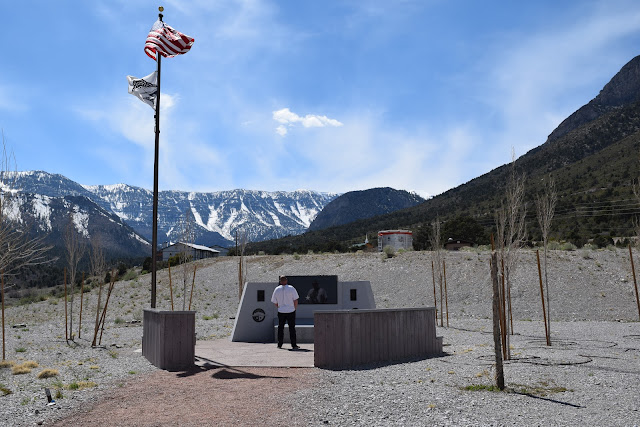Sixty-four years ago today, a plane crashed at Mt. Charleston.
If you were outside in today’s beautiful sunshine, it’s
hard to picture the snow storm that was raging around Mt. Charleston on this date decades ago.
On November 17, 1955, a C-54 military cargo plane traveling
from Burbank to Area 51 went off course, hit that terrible storm, and
ultimately crashed into Mt. Charleston about a half a mile from the peak. All
14 men aboard were killed.
No one, not even the families of the deceased, knew the
details of the flight or why the men were on the plane until after the details
were declassified in 1998 – although if one persistent man hadn’t been
tenaciously pursuing information about the crash, those details still might
have been lost, ignored as insignificant and forgotten again.
For decades the remnants of the plane littered the area
around the trail to the peak of Mt. Charleston. One of the most distinctive
pieces left was a propeller, twisted and gnarled. I saw it when my hubby and I
made the peak in 1996, and we, like everyone else, simply knew a plane had
crashed there.
Today the propeller is part of a memorial to the men of USAF
Flight 9068, which is next to the Silent Heroes of the Cold War memorial for those who served during those years. According the Forest
Service’s fact sheet, it’s the only national memorial to the Cold War era
of its kind.
Not until I visited the memorial with my husband, who is
himself a Cold War veteran, did I learn the whole story of the crash. I picked
up a copy of “Silent Heroes of the Cold War Declassified” by Kyril D. Plaskon
in the gift shop and learned the true story behind the flight.
The book starts out with a thorough background of the Nevada
Test Site, where the infamous Area 51 is located, and its role in atomic
testing as well as the development of the U2 spy plane. The flight from Burbank
to Area 51 was a regular flight taking people who were working on the U2 back
and forth on a daily basis.
On the day USAF Flight 9068 took off from Burbank, the
flight was a little late taking off because the pilot waited to see if one of the regular passengers would show up (he had overslept, which was a lucky thing for him). At a little after 7 a.m., the very secret flight departed for Area 51. The flight took a route through the mountains and according to the book, near Goodsprings
it went radio silent, flying without contact with the flight tower as it made
its way toward the Test Site.
Unfortunately, a storm was approaching and they were blown
off course to the east. The pilot was flying by sight, but the storm clouds
made that difficult. The disoriented crew soon realized they were in trouble. In
the book, Plaskon describes the crew “...dodging peaks just above the trees and
snow covered mountain range when their normal flight path should have taken
them over flat desert.”
At 8:19 a.m., the plane slammed into the side of Mount
Charleston, killing everyone aboard.
Plaskon’s book describes the harrowing recovery mission
undertaken, which ultimately involved the Sheriff’s Mounted Posse, which was
the Search and Rescue of its day. A team that included Sheriff Butch Leypoldt
led 17 horses to the crash site to bring the bodies back down, a gruesome chore
carried out in the midst of terrible storm conditions.
The entire incident might have gone unremembered had it not
been for Steve Ririe.
Ririe had seen the crash site and became interested in
knowing more about it... then the crash site seems to have become interested in
him, so to speak. The book recounts Ririe’s slightly paranormal experiences,
all of which led him – some might say compelled him – to pursue the story of
the crash. The story he uncovered is the reason there’s a memorial now to
commemorate the men who lost their lives.
The Cold War had no battles to feature on the nightly news.
It was, however, a pivotal time in world history when the entire world was
holding its breath in the hopes of averting a disaster, a time of secrets and
spies that still holds mysteries like Flight 9068.
The U2 spy plane was considered vital to our country’s
efforts to prevail in the quiet fight that was happening, and the men who died
that morning on Mt. Charleston were instrumental in its development.
The next time you’re at Mt. Charleston, take a moment to
stop at the memorial. Ponder the propeller, preserved as it was found at a
little over 11,000 feet. We almost didn’t get to hear the whole story of that
flight and the men aboard it.
They deserve remembering.


